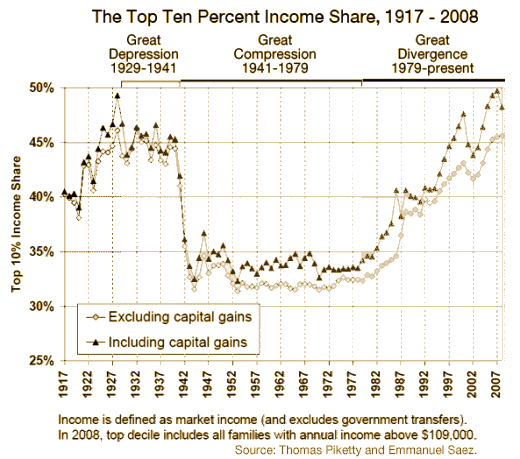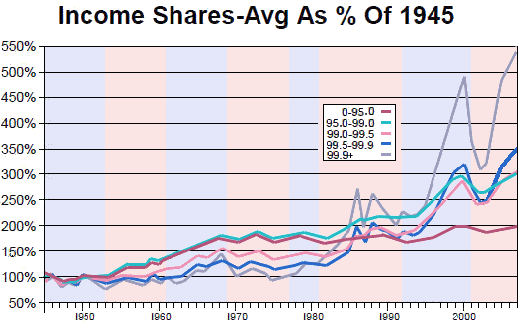I’ve been following the series in Slate called The United States of Inequality. There are 10 installments and I’ve already tried to pull out representative quotes from the first 6. The whole series is based on this graph showing the growing wealth inequity in the US in the last thirty years:

Here are my previous comments [in red] and the original installments [in dark]:
Rather than give quotes for the next three installments, I’ll just briefly summarize his conclusions [they’re more complex than the earlier ones]:
In this installment, he looks at the galance of trade and the ‘outsourcing’ of manufacturing to other countries, particularly China. He quotes economists who have studied this and concludes that it’s not so big a factor as most of us think, but it is in the mix.
.Noah points to the work of Emmanual Saez at Berkley who has shown that the bulk of the concentration of wealth has been among the Super-Rich [top 0.1%] – the Corporate CEO’s and top Financial poeople – the Corporatocracy...

"The abrupt halt and subsequent slowdown of gains in educational attainment began at about the same time as the Great Divergence. Before the Great Divergence, the country enjoyed at least three decades of growing income equality, an epoch that Goldin and Boston University economist Robert Margo have termed "The Great Compression." Between 1900 and the mid-1970s, U.S. incomes became dramatically more equal while educational attainment climbed. But starting in the mid-1970s and continuing to today, incomes became dramatically less equal while educational attainment stagnated. Katz and Goldin believe this is not a coincidence." He sees failings in the educational system as a much bigger contributor than I would have thought.
In this 9th installment, author Timothy Noah takes a stab at the relative weighting of the factors in causing "The Great Divergence":
We have now reviewed all possible causes of the Great Divergence—all, at least, that have thus far attracted most experts’ attention. What are their relative contributions? Here is a back-of-the-envelope calculation, an admittedly crude composite of my discussions with and reading of the various economists and political scientists cited thus far:
At first, this list seemed arrogant to me since it’s so subjective. But in rereading his installments, I changed my mind, deciding it was a useful benchmark for partitioning the factors, albeit just an estimate from his interviews with a sea of economists.And his speculations fit the data. There’s a tenth installment [10. Why We Can’t Ignore Growing Income Inequality] where Noah takes on the Conservative arguments that we shouldn’t worry about income equity. But that’s enough for now. Taking on Conservatives deserved a post of its own…
Sorry, the comment form is closed at this time.